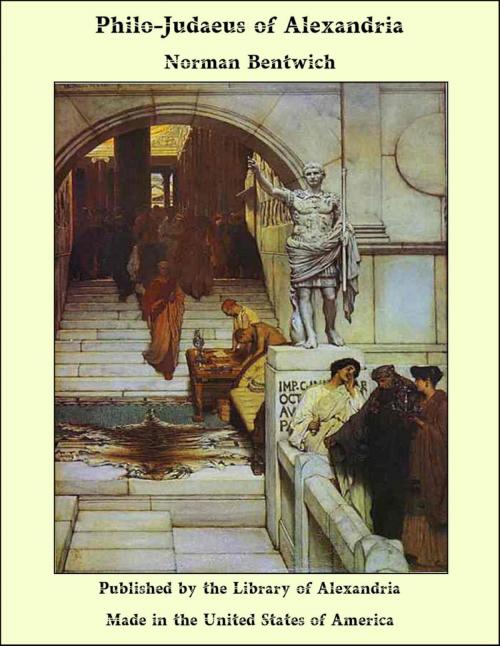Philo-Judaeus of Alexandria
Nonfiction, Religion & Spirituality, New Age, History, Fiction & Literature| Author: | Norman Bentwich | ISBN: | 9781465582683 |
| Publisher: | Library of Alexandria | Publication: | March 8, 2015 |
| Imprint: | Language: | English |
| Author: | Norman Bentwich |
| ISBN: | 9781465582683 |
| Publisher: | Library of Alexandria |
| Publication: | March 8, 2015 |
| Imprint: | |
| Language: | English |
It is a melancholy reflection upon the history of the Jews that they have failed to pay due honor to their two greatest philosophers. Spinoza was rejected by his contemporaries from the congregation of Israel; Philo-Judæus was neglected by the generations that followed him. Maimonides, our third philosopher, was in danger of meeting the same fate, and his philosophical work was for long viewed with suspicion by a large part of the community. Philosophers, by the very excellence of their thought, have in all races towered above the comprehension of the people, and aroused the suspicion of the religious teachers. Elsewhere, however, though rejected by the Church, they have left their influence upon the nation, and taken a commanding place in its history, because they have founded secular schools of thought, which perpetuated their work. In Judaism, where religion and nationality are inextricably combined, that could not be. The history of Judaism since the extinction of political independence is the history of a national religious culture; what was national in its thought alone found favor; and unless a philosopher's work bore this national religious stamp it dropped out of Jewish history. Philo certainly had an intensely strong Jewish feeling, but his work had also another aspect, which It was left till recently to non-Jews to study the works of Philo, to present his philosophy, and estimate its value. So far from taking a Jewish standpoint in their work, they emphasized the parts of his teaching that are least Jewish; for they were writing as Christian theologians or as historians of Greek philosophy. They searched him primarily for traces of Christian, neo-Platonic, or Stoic doctrines, and commiserated with him, or criticised him as a weak-kneed eclectic, a half-blind groper for the true light.
It is a melancholy reflection upon the history of the Jews that they have failed to pay due honor to their two greatest philosophers. Spinoza was rejected by his contemporaries from the congregation of Israel; Philo-Judæus was neglected by the generations that followed him. Maimonides, our third philosopher, was in danger of meeting the same fate, and his philosophical work was for long viewed with suspicion by a large part of the community. Philosophers, by the very excellence of their thought, have in all races towered above the comprehension of the people, and aroused the suspicion of the religious teachers. Elsewhere, however, though rejected by the Church, they have left their influence upon the nation, and taken a commanding place in its history, because they have founded secular schools of thought, which perpetuated their work. In Judaism, where religion and nationality are inextricably combined, that could not be. The history of Judaism since the extinction of political independence is the history of a national religious culture; what was national in its thought alone found favor; and unless a philosopher's work bore this national religious stamp it dropped out of Jewish history. Philo certainly had an intensely strong Jewish feeling, but his work had also another aspect, which It was left till recently to non-Jews to study the works of Philo, to present his philosophy, and estimate its value. So far from taking a Jewish standpoint in their work, they emphasized the parts of his teaching that are least Jewish; for they were writing as Christian theologians or as historians of Greek philosophy. They searched him primarily for traces of Christian, neo-Platonic, or Stoic doctrines, and commiserated with him, or criticised him as a weak-kneed eclectic, a half-blind groper for the true light.















